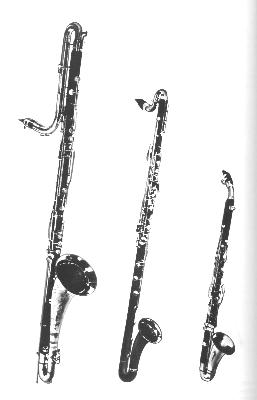 The
Clarinet Family
The
Clarinet Family
There are actually a lot different
types of clarinets. The type of clarinet you are probably most
familiar with is the "Bb Clarinet" - this is the clarinet most often
used in bands, jazz and orchestras. If you played clarinet back in
school, this is the instrument you would have played. There are over
ten different kinds of clarinets in the Clarinet Family.
Additionally, for each kind of clarinet there are a number of
different variations in terms of keywork and bore. Let's just say
there are a lot of different types of clarinets.
"Big Clarinets" >

Buddy DeFranco
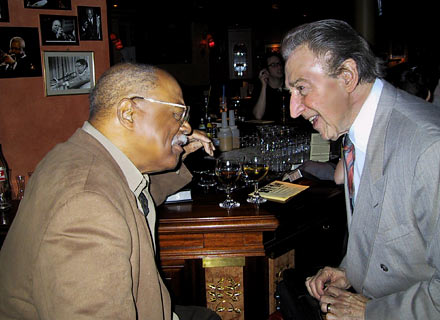 No
man living has witnessed more jazz history than clarinettist Buddy
DeFranco. Born in 1923, he first played in public at the age of 12.
Working in some of the top swing bands while still a teenager,
DeFranco then contributed to the bebop revolution in New York during
the 1940s. He recorded with Dizzy Gillespie, Charlie Parker, Oscar
Peterson, Art Tatum and many others. With his mastery of the
harmonic language of modern jazz, his characteristic tone and his
scintillating command of the top register, Buddy's
grit, groove and grace won him 20 Down Beat Polls, 14 Playboy All
Star Awards, seven Metronome All Star Polls, and three Melody Maker
polls.
No
man living has witnessed more jazz history than clarinettist Buddy
DeFranco. Born in 1923, he first played in public at the age of 12.
Working in some of the top swing bands while still a teenager,
DeFranco then contributed to the bebop revolution in New York during
the 1940s. He recorded with Dizzy Gillespie, Charlie Parker, Oscar
Peterson, Art Tatum and many others. With his mastery of the
harmonic language of modern jazz, his characteristic tone and his
scintillating command of the top register, Buddy's
grit, groove and grace won him 20 Down Beat Polls, 14 Playboy All
Star Awards, seven Metronome All Star Polls, and three Melody Maker
polls.
DeFranco was
the jazz clarinet player of significance during the decades that
followed the mid-century hegemony of Benny Goodman and Artie Shaw.
Now, past the age of eighty, he still plays elegantly. For evidence,
hear his new CD, Cookin’ the Books (Arbors Records, ARCD
19298).
<Clark Terry & Buddy DeFranco
“There are two
approaches to playing jazz. In one area, which is still valid –
don’t misunderstand me – the players believe that too much
practising, or any practising, inhibits you from playing good jazz.
So they don’t like the idea of study, or practice of any of the
fundamentals. Using that approach to jazz are some very well known
players. Pee Wee Russell was a good example. He was not a schooled
player, but he did play a form of jazz, as opposed to Benny Goodman
or Artie Shaw, who obviously had formal training. I’m from the
latter school. I believe that you need as much technique as you can
acquire, in order to say what you are going to say immediately,
extemporaneously.
“You’ve got to learn the formal scales, arpeggios, chords, before
you can go into jazz and execute what you’re thinking. I acquired
the technique from formal training. I was a symphonic clarinettist
before I started playing jazz.”
Have you worked hard at gaining command of the very high notes?
“What started me thinking about playing that high register was
Artie Shaw. He was just fascinating, the way he had control of the
high register. He was unstoppable. Most clarinettists, when they
played high, they played fail-safe music, fail-safe licks. They
would play what they were comfortable with, so that there would be
no trouble. Artie disregarded that. He just played. That’s what I
try to do. In those days you couldn’t get close to Artie or Benny. I
did get close to Benny, but even Benny Goodman, when you brought up
the clarinet, he didn’t want to talk about his secrets.
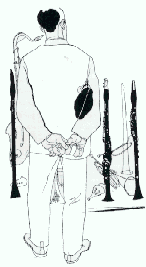 “Times
have changed. Now it’s very open. You can study so many different
ways. I approve. Unfortunately, it sometimes turns out automatons or
clones, which I don’t approve. Originality is more important than
anything you can do on the instrument. There’s no such thing as
mastering an instrument, but if you want to develop your technique,
all it takes is practice. But you cannot develop a personality by
practising. Somehow, it has to come through from within. The trick
is to bring your personality into your playing. If you are staying
with all those patterns that you cloned, you are not going anywhere.
It’s easy to talk about; it’s not easy to do.”
“Times
have changed. Now it’s very open. You can study so many different
ways. I approve. Unfortunately, it sometimes turns out automatons or
clones, which I don’t approve. Originality is more important than
anything you can do on the instrument. There’s no such thing as
mastering an instrument, but if you want to develop your technique,
all it takes is practice. But you cannot develop a personality by
practising. Somehow, it has to come through from within. The trick
is to bring your personality into your playing. If you are staying
with all those patterns that you cloned, you are not going anywhere.
It’s easy to talk about; it’s not easy to do.”
Nevertheless, Buddy admits that there is a place for fail-safe
playing.
“There’s a trick that I learned from Charlie Parker. That is, to be
so zeroed in on what you’re playing that no matter what is happening
behind you, it doesn’t really matter. Through the years Charlie
Parker has played with some of the worst rhythm players. But when
you hear him, you’re convinced that he’s got a great rhythm section.
He blanks it out. He’s so dominant, so positive."
How do you develop that?
"By listening, observing. It all boils down to the same thing:
fundamentals. I practise the fundamentals every day. The only change
that I made (it’s a question of my ego) is some years ago I wrote a
book – it’s still available – of Hanon exercises. The original Hanon
exercises for the piano are all in C. I decided that a Hanon
exercise for clarinet should be in all keys, so I called it Hand
in Hand with Hanon, and it’s a Hanon exercise in every key. I
added that to my practice. I’m very strict with practice. It’s a
question of being very compulsive."
Does Buddy regard himself as compulsive?
"If you weren’t compulsive, you wouldn’t be a clarinet player."
Buddy DeFranco has
been a Yamaha artist since 1985. He performs on the Yamaha Custom V.
Buddy is one of Yamaha's most notable performing artists. Mr.
DeFranco is one of the most influential jazz artists in history,
winning countless awards and appearing on a multitude of jazz
recordings. He has appeared with Gene Krupa, Tommy Dorsey, and Count
Basie to name a few. At the young age of 80 Buddy remains
imaginative and active as a performer and international clinician.
My Yamaha Custom clarinet "covers all the bases"! It is free
blowing, the intonation top to bottom is quite good, and very even.
It has a full, rich tone, and a very comfortable key mechanism.
Selected
Recordings
Crosscurrents with L. Tristano (1949, Cap. 11060)
Buddy De Franco and Oscar Peterson play George Gershwin
(1954, Verve 314 557 099-2)
Art Tatum-Buddy DeFranco Quartet with Art Tatum (1956, Verve
8229)
Buddy DeFranco Meets the Oscar Peterson Quartet (1985,
Pablo 2310915)
Alan
Barnes
 Born
in 1959 in Altrincham, Barnes plays all of the single reeds, and is
a superb clarinettist. His live album, Cannonball, was voted
album of the year in the 2001 British Jazz Awards and he was named
BBC Jazz Instrumentalist of the Year. He now has his own record
label, Woodville Records. Barnes possesses an
in-depth knowledge of jazz history, coupled with a sincere love of
pre-1950s jazz.
Born
in 1959 in Altrincham, Barnes plays all of the single reeds, and is
a superb clarinettist. His live album, Cannonball, was voted
album of the year in the 2001 British Jazz Awards and he was named
BBC Jazz Instrumentalist of the Year. He now has his own record
label, Woodville Records. Barnes possesses an
in-depth knowledge of jazz history, coupled with a sincere love of
pre-1950s jazz.
“The difference between jazz and classical clarinet is that
if you choose to have a jazz career there are so many different ways
you can go. With the classical thing, there’s pretty much an agreed
path. There are sets of exercises and repertoire. But in jazz, with
all of the different sounds, for instance, on the clarinet, you can
go different ways.
"The difference between Sidney Bechet, Johnny Dodds and Artie Shaw
is phenomenal. I’m not sure that any one clarinettist can get all of
those sounds. Maybe Tony Coe could. So I guess that if a student was
interested in playing jazz you’d have to choose more specifically
than just jazz. It would have to be down to individuals, to
clarinettists that enthuse that student.
Listening is absolutely paramount. The first thing I say to any
student who comes to me, before I accept them, is: ‘Who do you
listen to?’ It’s phenomenal to me that certain people don’t listen
to anybody. And they want to be a jazz clarinet player! For
instance, I’ve had tenor students say they haven’t heard Don Weller,
and they haven’t heard Dick Morrisey, or Bobby Wellins. And I think,
if they haven’t heard these people… and they are on the doorstep...”
Alan shrugs, and smiles.
“Often people don’t realise that’s what music is about:
listening. Performing is about listening. In jazz, when you’ve
finished your chorus, you don’t then ignore what everybody else is
doing, because it should change what happens next.
"I would start with Johnny Dodds – with Louis Armstrong’s Hot Five –
in Weary Blues. Anybody of Grade 2 or Grade 3 standard could
probably play the two Johnny Dodds choruses on Weary Blues, a
beautiful solo. You don’t have to have the greatest technique in the
world to play great jazz. Dodds’ sound is probably an acquired taste
for some people, but it’s instantly recognisable, and it’s certainly
full. It’s only two choruses long, so you learn brevity."
Do you recommend that they memorise or transcribe?
“Whichever you want to do. If you can sing it, you’ve learnt it.
There’s also a value in writing it down; you can learn to read by
transcribing. To me, the early jazz players played the clarinet like
a clarinet. And as it went on, you thought – oh, isn’t it amazing
that they can do that on the clarinet?
“In the old days they played clarinetty things. Which is what I
think is the instrument’s strength. So you get Barney Bigard doing
all those odd intervals that would be difficult on the trumpet.
That’s why I don’t really play bebop on the clarinet. I always use
it at a point in the programme where it’s either a ballad, or
something where you can play a clarinet like a clarinet.
“Some of the early clarinettists exploited the problems of the
clarinet, like the three different sounds, instead of trying to make
it smooth from bottom to top. Why not have three different sounds,
as Sidney Bechet did? And then there’s Pee Wee Russell, getting in
all the wheezy throat notes. Jimmy Guiffre is another one. There’s a
man who has obviously got the whole of the musical concept together,
then he chooses to play the clarinet in the low register! I love his
playing.”
Is there a place for practising patterns for jazz?
“I think you’ve got to do some sort of exotic scale practice.
For instance, if Bflatm7flat5 to Eflat7aug#9 comes up, for a bar
each, you’ve got to have practised whatever you think fits that. I
actually get some phrases going on those things. Otherwise, with the
clarinet, and the cross-fingering, when you are improvising, you are
going to end up in all kinds of trouble.”
So, preparation is acceptable?
“There are two schools of thought. Lee Konitz thought that
improvising should be just that. Yet Louis Armstrong played the same
solos night in and night out. I don’t think that stopped it from
being some of the best jazz ever played. Jazz is prepared, but not
totally prepared.”
Clarinet Exponents
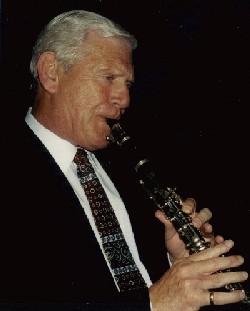 Dave
Shepherd
born London 7
February 1929 clarinet
Dave
Shepherd
born London 7
February 1929 clarinet
Dave became interested in the clarinet at the
age of sixteen after hearing The First English Public Jam Session
recorded 6 November 1941 (the recording featured Harry Parry playing
clarinet on I Found A New Baby). Dave was taught to play the
clarinet by Bernie Izen, Freddy Randall's clarinet player at the
time. At eighteen he was conscripted to the army for national
service and posted to the British Forces Radio Network Quartet in
Hamburg, Germany. During this time he received lessons for the two
years of service from the principal clarinettist of the Hamburg
State Orchestra.
After leaving the army in 1949 he turned professional and in 1951
joined the Joe Daniels' Hot Shots (which later became the Joe
Daniels Jazz Group). Dave joined the Freddy Randall Band in 1953,
played with the band until early 1955. During this time he played on
two LPs for the American market at the IBC Studios in London circ.
1953 (Salute to Benny Goodman for the solitaire Manhattan Label,
with the Teddy Foster's Big Band and also with his quartet). Then in
1955 Dave decided to go to America, playing in New York with many of
the best U.S. musicians at that time.
He returned to the UK in late 1956, toured with Norman Granz Jazz at
the Philharmonic, and worked with the Oscar Peterson Trio, Ella
Fitzgerald, Stan Getz, Coleman Hawkins, Dizzy Gillespie, Roy
Eldridge, Sonny Stitt, Lou Levy, Gus Johnson and the Dill Jones
Quartet to name a few. During this time he formed the Dave Shepherd
Quintet and began broadcasting on BBC Radio as well as working with
the The Jazz Today Unit and touring with Gerry Mulligan, Billie
Holiday and Mary Lou Williams.
In 1960 Dave rejoined the Freddy Randall Band until the end of the
Trad Boom, and then commenced a series of tours with Teddy Wilson in
the UK, Europe and South Africa.
During the middle of 1972 the Northern Arts Council approached him
to join a band called Britain's Greatest Jazz Band. The band was
formed from a nominated group of British jazz musicians for a tour
in the far north of England from 28 July - 1 August 1972. From the
tour an LP was recorded. After the tour the band decided to remain
together and called themselves the Freddy Randall/Dave Shepherd Jazz
All Stars, which played several concerts and numerous BBC Radio
broadcasts. LPs were recorded for Black Lion and the band
represented the UK in the Alan Bates Salute to Swing event at the
Montreux Festival in July 1973. An LP was also recorded with Teddy
Wilson at this event.
After Randall disbanded, Dave played with American jazz legends such
as Bud Freeman, Yank Lawson, Ruby Braff, Wild Bill Davison and
Barney Kessel. In the 1980s he toured with the Benny Goodman Alumni
Sextet (Pete Appleyard, Barney Kessel, Bobby Rosengarden, Major
Holley and Derek Smith) before becoming leader of the Pizza Express
All-Stars in 1981. Dave toured New Zealand in 1986, and appears
regularly in various venues/jazz clubs all over the UK with and
without the quintet.
Jazz festivals he has played include; Montreux 1973, Edinburgh
throughout the 1980s, Cork, The Hague, Dresden, Nice, Glasgow, Isle
of Man, Jersey and Chichester.
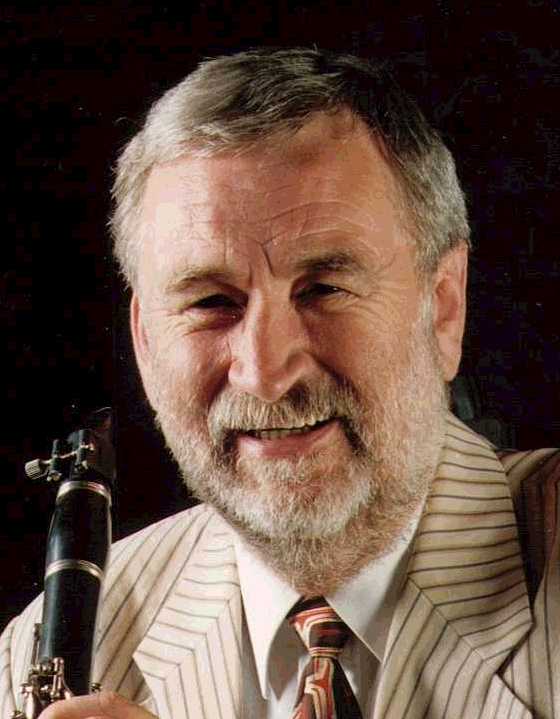 Chris
Walker - born
in 1939 and took up playing clarinet at the age of 15, having been a
member of the school recorder band since he was 11. After leaving
school he played regularly around the London jazz scene, as a member
of The Freddy Shaw Jazzmen, before becoming a professional musician
with The London City Stompers and, later, with the Mike Daniels Big
Band and Colin Kingwell’s Jazz Bandits. Chris moved to Hampshire in
1969 and, since then, he has worked with most of the local jazz
personalities, was a member of The Real Ale & Thunder Band for 18
years, and has run his own highly successful 5-piece ‘Swingtet’ for
the last 15 years. Whilst with the Real Ale & Thunder Band, Chris
was, in 1987, the musical director for an historic BBC “Songs of
Praise” from The Maltings in Farnham and, since 1980; he has
produced a series of music and information based jazz programmes for
BBC Local radio all across the South. Currently
he can be heard, every Sunday, presenting the Jazz hour between 4pm
and 5pm on BBC Radio Solent and on BBC Southern Counties Radio. He
also produces and presents the complete jazz diary for the area on
Tuesdays and Fridays on BBC Solent. In addition to managing and
fronting ‘The Chris Walker Swingtet’, Chris has, for Messrs P&O
Cruises, co-ordinated Jazz Themes aboard 7 highly appraised cruises
on both Canberra and Oriana. He also acts as jazz advisor to
Portsmouth City Council for their Jazz Day every summer on Southsea
Sea front, helped set up the original concept for the Chichester
Real Ale & Jazz Festival, and now, annually arranges and hosts the
jazz programme for the Reading Real Ale & Jazz Festival every July.
Chris
Walker - born
in 1939 and took up playing clarinet at the age of 15, having been a
member of the school recorder band since he was 11. After leaving
school he played regularly around the London jazz scene, as a member
of The Freddy Shaw Jazzmen, before becoming a professional musician
with The London City Stompers and, later, with the Mike Daniels Big
Band and Colin Kingwell’s Jazz Bandits. Chris moved to Hampshire in
1969 and, since then, he has worked with most of the local jazz
personalities, was a member of The Real Ale & Thunder Band for 18
years, and has run his own highly successful 5-piece ‘Swingtet’ for
the last 15 years. Whilst with the Real Ale & Thunder Band, Chris
was, in 1987, the musical director for an historic BBC “Songs of
Praise” from The Maltings in Farnham and, since 1980; he has
produced a series of music and information based jazz programmes for
BBC Local radio all across the South. Currently
he can be heard, every Sunday, presenting the Jazz hour between 4pm
and 5pm on BBC Radio Solent and on BBC Southern Counties Radio. He
also produces and presents the complete jazz diary for the area on
Tuesdays and Fridays on BBC Solent. In addition to managing and
fronting ‘The Chris Walker Swingtet’, Chris has, for Messrs P&O
Cruises, co-ordinated Jazz Themes aboard 7 highly appraised cruises
on both Canberra and Oriana. He also acts as jazz advisor to
Portsmouth City Council for their Jazz Day every summer on Southsea
Sea front, helped set up the original concept for the Chichester
Real Ale & Jazz Festival, and now, annually arranges and hosts the
jazz programme for the Reading Real Ale & Jazz Festival every July.
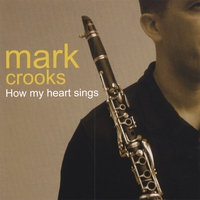 Mark
began his musical training by earning a degree in music performance
at the Royal Scottish Academy of Music. He moved to London to study
on the postgraduate jazz course at the Guildhall School of Music
after winning the Young Jazz Player of the Year Competition in 1991.
Since leaving college Mark has worked in a wide range of musical
settings including classical work and shows but is most at home in
the jazz world. He has played in all of London’s top jazz venues and
at jazz festivals up and down the country. A recent highlight was a
week’s engagement at Ronnie Scott’s with the John Critchinson
Quartet opposite the Mingus Big Band. Mark’s own group
features his clarinet and tenor with the brilliant guitar playing of
Colin Oxley and is featured on his highly-rated CDs “I Won’t Dance”
and the brand new “How My Heart Sings”. Mark is a member of
the Back To Basie Orchestra and the John Wilson Orchestra. He also
enjoys appearing in a two-tenor “Al and Zoot” group with Jim
Tomlinson and a two-clarinet “Benny” quintet with Julian Stringle.
Mark was the featured soloist in a gala “Tribute to Artie Shaw”
concert in Dublin’s National Concert Hall in January 2006. A
hand-picked 26 piece orchestra accompanied Mark in scintillating
performances of original Shaw arrangements including the infamous
Interlude in Bb for clarinet and string quartet and Shaw’s virtuoso
Concerto for Clarinet .The concert was such a great success that
Mark was immediately invited back to perform a Benny Goodman
programme in April 2007 and to reprise the Artie Shaw with Strings
Concert in October 2007.
Mark
began his musical training by earning a degree in music performance
at the Royal Scottish Academy of Music. He moved to London to study
on the postgraduate jazz course at the Guildhall School of Music
after winning the Young Jazz Player of the Year Competition in 1991.
Since leaving college Mark has worked in a wide range of musical
settings including classical work and shows but is most at home in
the jazz world. He has played in all of London’s top jazz venues and
at jazz festivals up and down the country. A recent highlight was a
week’s engagement at Ronnie Scott’s with the John Critchinson
Quartet opposite the Mingus Big Band. Mark’s own group
features his clarinet and tenor with the brilliant guitar playing of
Colin Oxley and is featured on his highly-rated CDs “I Won’t Dance”
and the brand new “How My Heart Sings”. Mark is a member of
the Back To Basie Orchestra and the John Wilson Orchestra. He also
enjoys appearing in a two-tenor “Al and Zoot” group with Jim
Tomlinson and a two-clarinet “Benny” quintet with Julian Stringle.
Mark was the featured soloist in a gala “Tribute to Artie Shaw”
concert in Dublin’s National Concert Hall in January 2006. A
hand-picked 26 piece orchestra accompanied Mark in scintillating
performances of original Shaw arrangements including the infamous
Interlude in Bb for clarinet and string quartet and Shaw’s virtuoso
Concerto for Clarinet .The concert was such a great success that
Mark was immediately invited back to perform a Benny Goodman
programme in April 2007 and to reprise the Artie Shaw with Strings
Concert in October 2007.

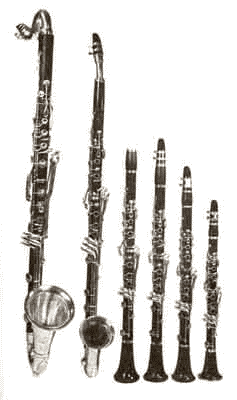
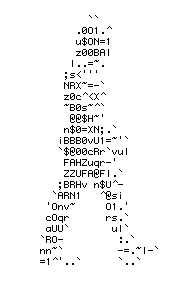 The
Chiltern Hundreds Jazz
Festival - yes it is possible - given Arts Grants and Corporate support.
There are sufficient venues both in the Town Centres and the surrounding Villages
to create a Major Annual Event (even Bicester organises one) - If you are
interested then declare here in what capacity you are prepared to assist.
The
Chiltern Hundreds Jazz
Festival - yes it is possible - given Arts Grants and Corporate support.
There are sufficient venues both in the Town Centres and the surrounding Villages
to create a Major Annual Event (even Bicester organises one) - If you are
interested then declare here in what capacity you are prepared to assist.